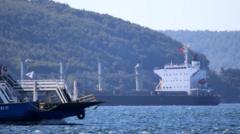In the heart of Karachi, Pakistan’s largest city, extreme heat transforms daily life into a relentless struggle for survival. It’s still early morning, but the sun is already radiating an unbearable heat, making the air stifling. At 32 years old, Shahbaz Ali, a ride-hailing motorcycle driver, faces an arduous day of work, drenched in sweat even before he embarks on his 12-hour shift amidst the city’s notorious traffic.
During the day, temperatures often surpass 104 degrees Fahrenheit (40 degrees Celsius), coupled with high humidity from the nearby Arabian Sea, turning the heat index to an excruciating 115. "It feels like living in a furnace," Ali remarked last month while navigating the perilous roads of Karachi, where heat and congestion go hand in hand. “But I have no choice; if I don’t work, my family won’t eat.”
Accompanied by Ali on his daily routine, I experienced firsthand the oppressive conditions he faces in a city that some deem unlivable due to the relentless heat. The struggle is amplified by frequent power outages, leaving families in the dark and helpless during the hottest times of the day. Yet, Ali remains resilient, using a rechargeable emergency light to assist his children with their homework when the electricity cuts out.
As Karachi's citizens confront the escalating heat waves, with no end in sight, the stories of individuals like Shahbaz Ali emerge as stark reminders of the human cost behind climate change and urban living. Despite the challenges, families continue their routines, embodying the spirit of endurance in the face of extreme adversity.
During the day, temperatures often surpass 104 degrees Fahrenheit (40 degrees Celsius), coupled with high humidity from the nearby Arabian Sea, turning the heat index to an excruciating 115. "It feels like living in a furnace," Ali remarked last month while navigating the perilous roads of Karachi, where heat and congestion go hand in hand. “But I have no choice; if I don’t work, my family won’t eat.”
Accompanied by Ali on his daily routine, I experienced firsthand the oppressive conditions he faces in a city that some deem unlivable due to the relentless heat. The struggle is amplified by frequent power outages, leaving families in the dark and helpless during the hottest times of the day. Yet, Ali remains resilient, using a rechargeable emergency light to assist his children with their homework when the electricity cuts out.
As Karachi's citizens confront the escalating heat waves, with no end in sight, the stories of individuals like Shahbaz Ali emerge as stark reminders of the human cost behind climate change and urban living. Despite the challenges, families continue their routines, embodying the spirit of endurance in the face of extreme adversity.



















